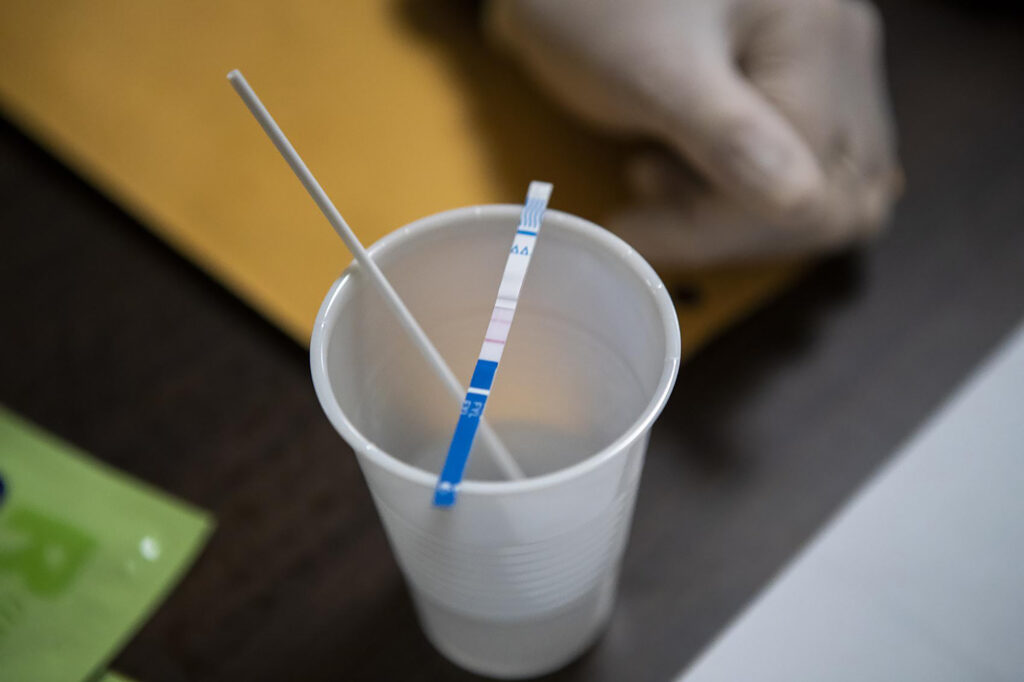A drug test strip is a small strip of paper that can detect the presence of cutting agents, like fentanyl, in all different kinds of drugs.
Under the current state code, drug testing strips are considered drug paraphernalia. This means someone who is found in possession of drugs can be additionally charged for possession of drug paraphernalia if they have drug testing strips.
Senate Bill 269 removes drug testing strips from the state’s list of drug paraphernalia. It passed the Senate on Tuesday and the House of Delegates on Friday. The bill has gone to Gov. Jim Justice’s desk for his signature.
Lawmakers passed a similar bill in 2022, exempting testing strips that detect fentanyl from that statute. House Bill 4373 went into effect in June of that year.
Proponents of the bill like Iris Sidikman (they/them), harm reduction program director for the Women’s Health Center in Charleston, say it could save lives.
They said while the fentanyl testing strips have been useful, the newest cutting agent, xylazine is the most requested test strip. Under current state law, it would be illegal for the clinic to distribute xylazine tests.
“The most immediate thing that this legislation would allow is for us to distribute xylazine test strips, which many people have asked me about here at the clinic as part of our Harm Reduction Program. People are interested in them,” Sidikman said.
According to the Bureau for Public Health’s Drug Overdose Mortality report, in 2021 fentanyl and fentanyl analogs were involved in 76 percent of all drug overdose deaths occurring in West Virginia, up from 58 percent in 2017.
According to a June 2023 report from the Centers for Disease Control and Prevention (CDC) brief, in 2021, the highest rate of drug overdose deaths involving xylazine occurred in Region 3, which includes Delaware, the District of Columbia, Maryland, Pennsylvania, Virginia, and West Virginia.
Fentanyl was the most frequently co-occurring drug mentioned on xylazine death records between 2018 and 2021.
Sidikman said people knowing what is in their drugs allows them to use more safely and better respond to overdoses around them.
“I think that they allow people to make better, more informed decisions about their health and what they do with their bodies and I think that that’s a good thing,” Sidikman said.
Sidikman said the harm reduction program aims to provide people with the tools necessary to stay healthy and safe while they navigate their lives.
“Whether or not they choose to end their substance use, reduce their substance use whatever they choose,” Sidikman said. “In order for people to be able to make positive changes in their life, they have to be alive.”
Sen. Eric Tarr, R-Putnam, was the only legislator to vote against Senate Bill 269.
“So in spite of all the efforts that we’ve made on these enablement measures, and that’s what I see, this is just, it’s another enablement feel-good measure,” Tarr said. “We are seeing still an escalation of our population that is using drugs and being significantly harmed by them.”
Tarr said he wants West Virginia to be the last place someone would want to use or sell drugs.
“West Virginia ought to be the absolute worst place in the country to be involved in the drug industry, illicit drug industry,” Tarr said. “This should be the absolute last place in the world you want to come to do drugs, sell drugs, be busted for drugs, and frankly, for rehab, because our rehab has been an abysmal failure.”
Sidikman said the legalization of all drug testing strips would allow them and their team to stay ahead and the newest cutting agents.
“If there is a new drug that enters the supply that we that testing strips are developed for, we would automatically be able to give those out and we wouldn’t have to wait and go back to the legislature and get those legalized before being able to give them out,” Sidikman said.
Appalachia Health News is a project of West Virginia Public Broadcasting with support from Charleston Area Medical Center and Marshall Health.




















